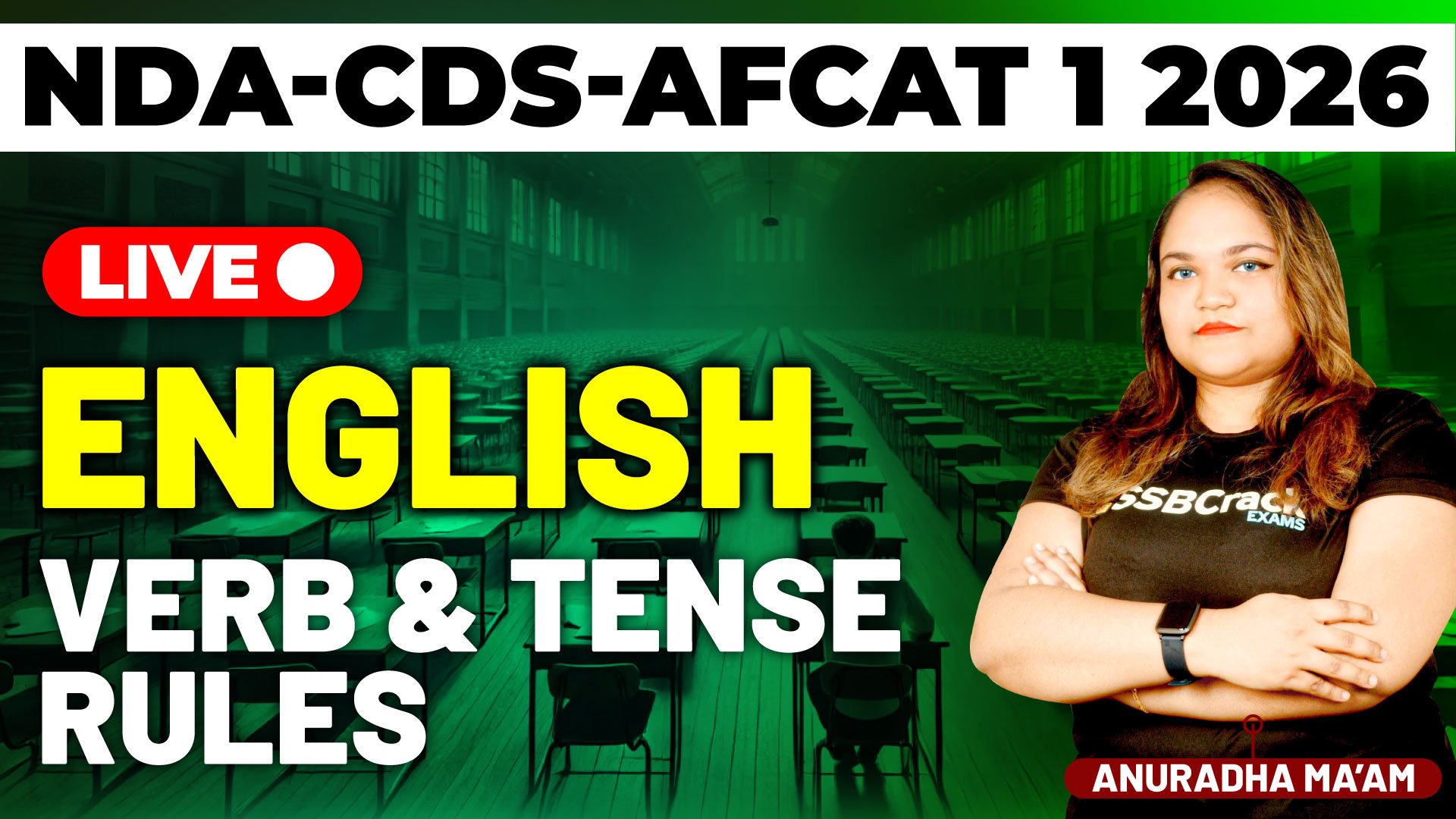When it comes to mastering English Grammar for defence exams such as NDA, CDS, and AFCAT 1 2026, a clear understanding of Verbs and Tenses is absolutely essential. These two topics form the heart of grammar, influencing nearly every question type — from Spotting Errors and Sentence Correction to Fill in the Blanks and Cloze Tests.
To help aspirants strengthen this vital area, a comprehensive live class on Verbs & Tenses Rules was conducted, focusing on conceptual clarity, error identification, and smart application of rules as per exam trends.
Objective of the Live Class
The live session aimed to:
- Simplify and explain fundamental and advanced rules of Verbs and Tenses.
- Enable students to detect and correct errors in exam-type sentences.
- Clarify the use of verb forms according to tense, subject, and meaning.
- Build confidence in solving grammar-based MCQs from NDA, CDS, and AFCAT papers.
The session ensured students moved beyond rote learning — focusing instead on understanding how verb logic and time reference operate in sentence construction.
Key Topics Covered in the Class
🔹 1. Verbs – Forms, Functions & Rules
A verb is the action or state of being in a sentence, and its correct form determines grammatical accuracy and sentence meaning.
✅ Topics Discussed:
- Types of Verbs: Main, Auxiliary, Modal, Transitive & Intransitive Verbs
- Forms of Verbs: Base, Past, Past Participle, Present Participle
- Regular & Irregular Verb Forms
- Subject-Verb Agreement (Concord Rules)
- Use of Modals (Can, Could, May, Might, Must, Shall, Should, Will, Would, etc.)
- Use of “Be,” “Do,” and “Have” as Auxiliary Verbs
- Common Verb Errors (e.g., use of “is/am/are,” “has/have,” “was/were,” “do/does/did”)
- Difference between Infinitive, Gerund & Participle
- Error Patterns involving Verb Forms (especially after “to,” “if,” “as if,” “wish,” etc.)
🔹 2. Tenses – Time, Sequence & Consistency
Tense expresses time — but in grammar, it’s more than just past, present, or future. It shows the state, continuity, and completion of action.
✅ Topics Discussed:
- Structure and Usage of all 12 Tenses:
- Simple, Continuous, Perfect, and Perfect Continuous forms of Past, Present & Future
- Rules for Maintaining Tense Consistency in a Sentence
- Sequence of Tenses in Complex Sentences
- Use of Tenses in Conditional Sentences (If-Clauses)
- Common Tense Errors in Exams
- Difference between “since” and “for” with Perfect Tenses
- Situational Usage of Present Perfect vs Past Simple
- Future Time Reference and Exceptions (using Present Tense for future events)
Practice & Application
During the live class, candidates practiced:
- Error Detection & Correction questions on verbs and tense forms.
- Sentence Improvement exercises based on tense consistency and agreement.
- Fill in the Blanks and Cloze Test questions requiring context-based verb form selection.
- Previous Year Question Practice for identifying high-frequency rules and patterns.
This ensured that aspirants could not only remember rules but apply them instantly in an exam setting.
Importance of Verbs & Tenses in Defence Exams
✅ For NDA:
- Around 10–12 questions in the English section are directly related to Verb forms and Tense rules.
- Commonly tested through Spotting Errors, Sentence Completion, and Fill in the Blanks.
✅ For CDS:
- The English paper heavily tests tense sequence, modal usage, and verb consistency, especially in Sentence Improvement and Error Detection sections.
- Strong conceptual clarity can help aspirants score 70+ marks easily.
✅ For AFCAT:
- Questions are mainly context-based, requiring correct tense and verb form selection.
- Regular practice ensures elimination of distractor options and quick accuracy.
Why Verbs & Tenses Matter So Much
- They determine the grammatical structure and accuracy of every sentence.
- Mastery of verb forms and tense rules helps in understanding reading comprehension passages effectively.
- Many high-frequency grammar topics like Voice, Narration, and Conditional Sentences are based on verb-tenses understanding.
- Also enhances spoken and written expression, a valuable skill for the SSB Interview and officer-level communication.
Conclusion
The Verbs & Tenses Live Class for NDA, CDS & AFCAT 1 2026 provided aspirants with a solid grammatical foundation, empowering them to handle one of the most crucial areas of English Grammar with confidence.
By focusing on conceptual understanding, rule application, and exam-based practice, this class ensures that students not only score higher but also develop the linguistic precision and clarity expected from a future officer of the Indian Armed Forces.
With consistent revision and daily practice of verb forms and tenses, aspirants can convert this topic into a high-scoring weapon in the English section.







